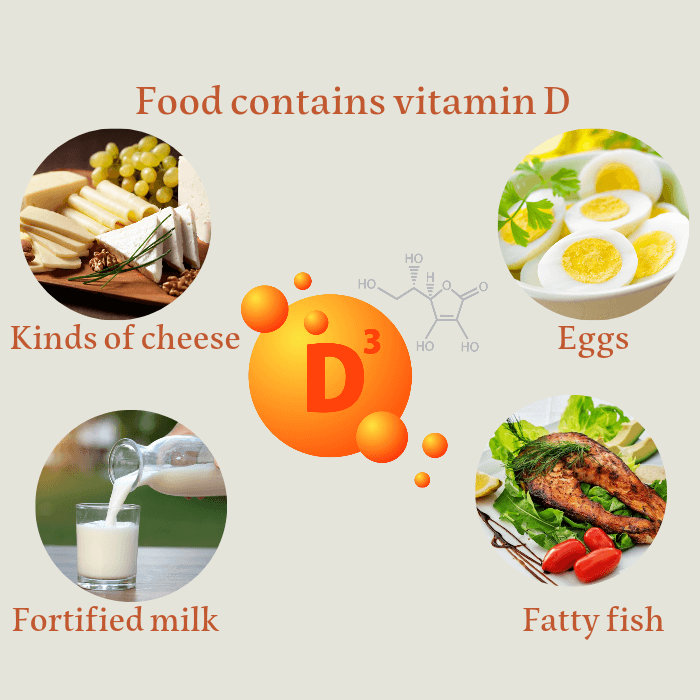Vitamin D deficiency symptoms in pregnancy are a serious problem that has many causes, can be affected by many factors, and need treatment to protect the pregnant woman's health.
Vitamin D is a fat-soluble vitamin, which is dissolved in fats and oils and can be stored for a long time in your body.
Vitamin D is known as the "sunshine vitamin" because it is produced when our skin is exposed to sunlight.
But sun exposure may not provide adequate vitamin D to a pregnant woman, so she may need to take vitamin D from her diet and take vitamin D supplements.
Vitamin D deficiency symptoms in pregnancy
Vitamin D deficiency is the most dangerous nutritional deficiency in pregnancy.
The danger of vitamin D deficiency is that it may be without symptoms. If you are deficient in vitamin D without symptoms and do not take any supplements during pregnancy, your baby may be deficient, too. Vitamin D plays a big role in pregnant women's health and their newborn.
Vitamin D deficiency symptoms in pregnancy are more dangerous than others.
Vitamin D deficiency symptoms in pregnancy are more common, Vitamin D deficiency in pregnant women and their children is a serious problem with severe complications for the health of both.
General fatigue
One of the common vitamin D deficiency symptoms in pregnancy is general fatigue, pregnant women usually feel tired, have general weakness, and can't do their daily work.
Repeated infection
Vitamin D has an important role in supporting the immune system, one of the vitamin D deficiency symptoms in pregnancy is it affects the immune system which becomes unable to resist infection and that may cause repeated infection.
Muscle weakness
Vitamin D deficiency leads to malabsorption of calcium and phosphorus, which increases the risk of bone pain, bone fracture, and muscle weakness. Which affects the normal activities of pregnant women.
Hair loss
Vitamin D is an essential nutrient that stimulates the hair follicles to grow. So when vitamin D deficiency occurs hair may be affected, and vitamin D low level may also be linked with an autoimmune case that causes patchy hair loss known as "alopecia areata".
Depression
Many studies find that most people that have depression also suffer from a deficiency of vitamin D. Low levels of vitamin D during pregnancy may lead to postpartum depression.
Slow wound healing
Wounds heal faster in people with normal blood levels of vitamin D than in those who have vitamin D deficiency.
Osteoporosis, loss of bone density, and broken bones
Vitamin D is very important for your bone health and many important functions in your body. Because it helps in good absorption of essential minerals that keep your bones healthy, for that reason vitamin D deficiency in pregnancy causes osteoporosis and loss of bone density.
Recently vitamin D has received a lot of attention for its role in immune health
It may also protect from cancer and other chronic condition as:
- Depression
- Bone loss
- Heart disease
- Type 2 diabetics
- Multiple sclerosis
Preeclampsia
Vitamin D deficiency symptoms in pregnancy have a direct influence on the pathogenesis of preeclampsia, yet the preeclampsia-vitamin D relation has not been studied. Vitamin D supplementation in the early stage of pregnancy is very important to promote newborn health and prevent preeclampsia.
Newborn health problems
Vitamin D deficiency during pregnancy increases the risk factor for poor fetal growth and some other problems such as abnormal bone growth, bone fracture, and congenital rickets, skin and eyesight problems.
Gestational diabetes mellitus
Gestational diabetes mellitus is one of the risk factors for vitamin D deficiency, the need for vitamin D increases during pregnancy.
Recent studies suggest that vitamin D receptors are found in many different cells, including cells responsible for the regulation of glucose metabolism such as pancreatic beta cells and muscles.
Vitamin D deficiency in pregnancy has a direct effect on pancreatic beta cells and affects their normal insulin secretion which increases the risk for gestational diabetes mellitus.
Causes of Vitamin D deficiency symptoms in Pregnancy
Vitamin D deficiency symptoms in pregnancy occur when the body does not get an adequate amount of vitamin D from sunlight or diet.
Some recommendations show that an adequate amount of vitamin D during pregnancy is 600 IU "international unit" per day. and if you are deficient 1000-2000 IU "international unit" per day is safe.

Some factors that may cause vitamin D deficiency symptoms in pregnancy
Pregnant women with darker skin may suffer from vitamin D deficiency more than others because they contain a lot of melanin pigmentation that acts as a sunscreen which reduces vitamin D production in the skin.
Obesity is because of the fat storage of a large amount of vitamin D.
Some medication, which prevents the absorption of vitamin D from the intestine.
Some foods contain vitamin D such as eggs, milk, and fatty fish but there is not a sufficient amount of this important vitamin during pregnancy.

Food contains vitamin D
- Fish liver oil and fatty fish
- Eggs
- Milk is a good source of vitamin D because all processed milk in the U.S. is fortified with vitamin D.
- Some cheese and yogurt.
Some pregnant women may need to take vitamin D supplements to relieve vitamin D deficiency symptoms in pregnancy.
Vitamin D deficiency symptoms If you are pregnant, you need to check your vitamin D serum level and take vitamin D supplementation to avoid vitamin D deficiency symptoms in pregnancy.
Finally, vitamin D is an essential vitamin, it's important for bone health and supports the immune system. If you suffer from bone and back pain, general weakness, and muscle pain you need to check the serum level of vitamin D.
Pregnant women are at high risk of vitamin D deficiency and require higher amounts of vitamin D than nonpregnant.
Some food contains vitamin D but maybe not enough as the daily need for vitamin D so you may need vitamin D supplements if you are deficient.


You must be logged in to post a comment.